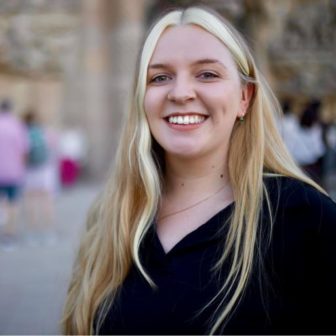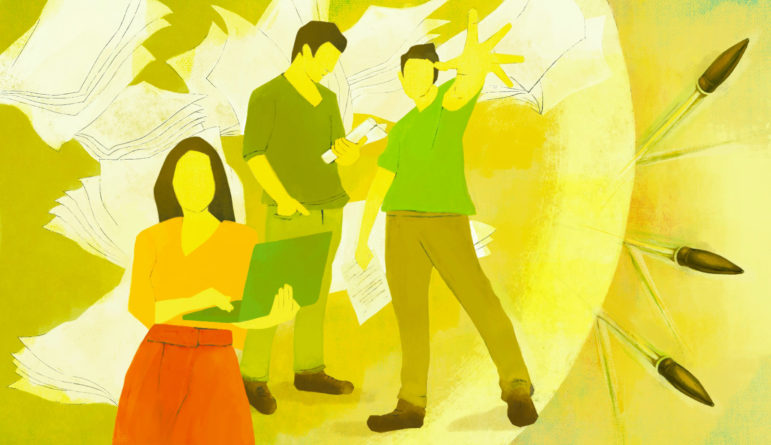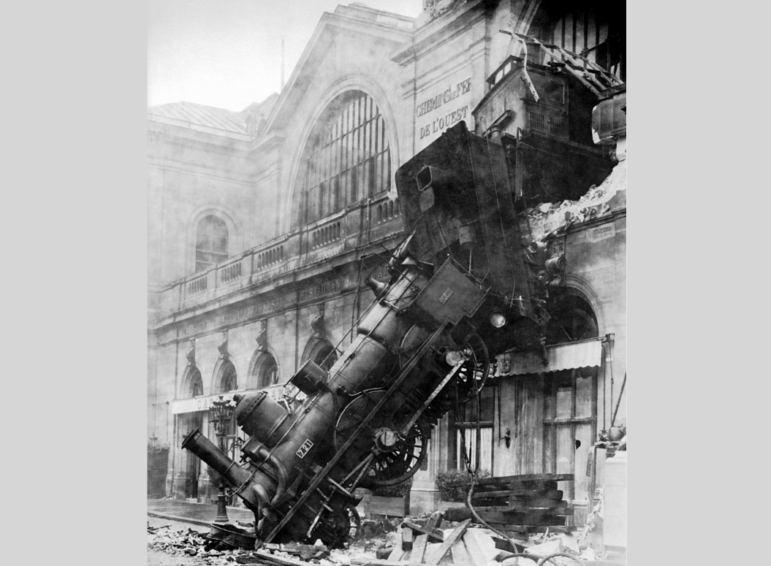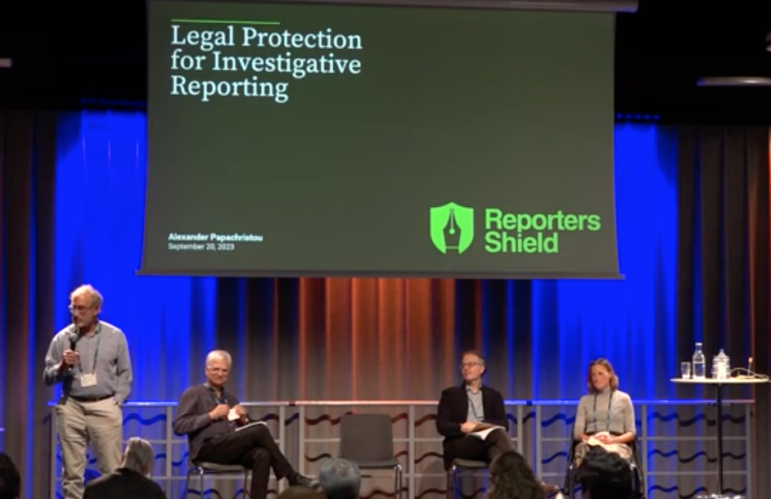

At CIJ's 2024 Summer Conference, Martin Tomkinson (left) and James Harkin talk about lessons learned over a 50-year career. Image: GIJN
Reporting Tips from an Investigative Journalist of 50 Years
Read this article in
“Ever since this book was published a few weeks ago, the joke in Soho has been that the author is now in more danger of being shot in the kneecaps by the police than he is by any of the professional pornographers,” read a 1982 review of Martin Tomkinson’s book, “The Pornbrokers: The Rise of the Soho Sex Barons.”
“But if Martin Tomkinson does get shot — and he’s quite a large target — I shall have to advise him that it was all his own fault on account of him being the prober par excellence,” it continued. “He could give lessons in Fleet Street on how to dig deep.”
Tomkinson, a veteran British financial journalist brimming with anecdotes from Fleet Street’s heyday, drew a rapt audience at CIJ’s 2024 Summer Conference. “One of the things that I’m constantly apologizing for is that most Fleet Street journalists swear like troopers,” he said. He recalled the days of smoking in newsrooms, and following the corrupt cops frequenting London pubs.
In a career spanning 50 years, Tomkinson has written for most of the UK’s major newspapers. In 1972, he started working for the satirical magazine Private Eye, before going freelance in 1981. He is also the author of two books. “I should hasten to add that Martin Tomkinson is still a working investigative journalist and a CIJ trainer,” James Harkin, the director of CIJ, said. “He has plenty of puff left in him.”
In his university days, Tomkinson appeared to be heading for a life of political activism, having featured in a World in Action documentary about the 1968 student protests taking place in response to the Vietnam War. He went on to participate in numerous other demonstrations, including anti-apartheid protests during the South African Springboks rugby union tour in 1970.
Through his political activities, though, he would meet Paul Foot, an investigative journalist and lifelong socialist who wrote for Private Eye on and off since it was founded. “I started playing cricket for Private Eye,” Tomkinson said, “and I got to know where he and Richard Ingrams [the magazine’s co-founder] and the other staff had lunch. So I’d meet them there, whatever. And one day Paul rang me up and said, ‘I want you to go up to Wakefield to cover a public bankruptcy hearing.’”

Journalist Jeffrey Joseph Bernard (left), Martin Tomkinson, and the co-founder of Private Eye magazine, Richard Ingrams (right), in London, circa mid-1970s. Image: Courtesy of Eric Hands
Having been introduced to the world of Private Eye journalism, Tomkinson investigated extreme right-wing politics and the murky underbelly of London’s Soho, particularly its pornography shops. “There were lots of legal, or semi-legal, private clubs where people would meet,” he said. “But two of the heaviest drinking classes of people were pornographers and the police, separately. So inevitably, you begin to get the possibility of corruption.”
Tomkinson’s investigation into the Soho pornography industry literally began outside his office doorstep, when his boss Ingrams grew irate that the space below Private Eye’s office was turned into a sex shop. “It was replaced by something called Doc Johnson’s Sex Parlour, or something like that,” Tomkinson recalled, “which enraged Ingrams, who was a great fan of Dr. Johnson, and they were taking his name, as it were. So I got to work and started investigating.”
His reporting uncovered that Doc Johnson’s was, in fact, a US import, with shops being opened up in various locations across Britain. “I then discovered that the provider of much of this pornography to the Doc Johnson’s chain was in fact a pornographer to the mafia,” he said. “And so, it becomes a good story. You’ve got the mafia, or a guy close to the mafia, supplying British pornographers.”
The government then introduced a licensing system, opening up further possibilities for corruption. Discussing a racketeer who gained control of many of the sex shops popping up across Soho, Tomkinson said that “when another pornographer wanted to open up, and he went to the police and said, ‘who do I pay and what?’ the police actually — senior policemen — said to him, ‘oh no, it’s not us, you have to talk to Bernie.’” The racketeer would eventually get arrested, alongside a raft of London’s paid-off police officers.

Longtime UK investigative journalist Martin Tomkinson (left) talking with Centre for Investigative Journalism director James Harkin at CIJ’s 2024 Summer Conference. Illustration: Dr. Andrew Salerno-Garthwaite
Throughout his talk, Tomkinson offered tips for up-and-coming investigative reporters.
- Be prepared for backlash. Tomkinson’s first tip is “to be quite mentally tough, because if you’re doing your job at all properly, you’re going to piss off a lot of people — many of them very powerful people, with access to lawyers.”
- Speak to lawyers. “Whatever level of journalism you’re committed to, you’re involved in, ensure it is lawyered. It’s a pain in the backside, but if you don’t do that, you risk not only bankrupting yourself, but bankrupting your employer, and you’ll be hard put to get another job,” he said. “Lawyers are surprisingly pro-freedom of the press. They will help you.”
- Avoid adjectives. “When I started at Private Eye, I used to write my copy, and I’d be like ‘this thieving bastard’ or whatever,” said Tomkinson recounting an early error. “Let the facts speak for themselves. You don’t have to actually point out the moral. You don’t have to say ‘this scumbag’ or whatever. You just put the facts down and the facts will speak for themselves. And that’s where you fall into trouble with lawyers – if you start making moral judgments.”
- Find a niche. “There are a lot of would-be investigative journalists out there. It’s a good idea to find a topic which isn’t particularly widely investigated and to make it your own,” Tomkinson explained. “I’m just about numerate — I’m nothing like an accountant. But I found that among Fleet Street newspapers, journalists had a horror of Companies House. They didn’t know what to do with it. They’d say ‘for God’s sake, you do it Martin,’ which gave me a living.”
- Be thorough. “Get your facts right. Check, check, check again. Because, for example, on Companies House, there’s something like six million individuals. I guarantee that whatever your name is, there is probably somebody with either the same, or a very similar, name to you,” he pointed out. “So if you’ve been looking for a connection […] and you’ve been at it probably all afternoon, all day, and you find something that looks as if it might be: check, check, and check again.”
- Have fun. “The final statement I would underline a hundred times is be careful, but have fun,” Tomkinson concluded, referring to an earlier statement by journalist Michael Gillard. “Because as you may or may not have gathered, I’ve had a lot of fun in my career.”
 Emily O’Sullivan is an editorial assistant at GIJN. She has worked as an investigative researcher for BBC Panorama, and an assistant producer for BBC Newsnight. She has an MA in Investigative Journalism from City, University of London.
Emily O’Sullivan is an editorial assistant at GIJN. She has worked as an investigative researcher for BBC Panorama, and an assistant producer for BBC Newsnight. She has an MA in Investigative Journalism from City, University of London.









